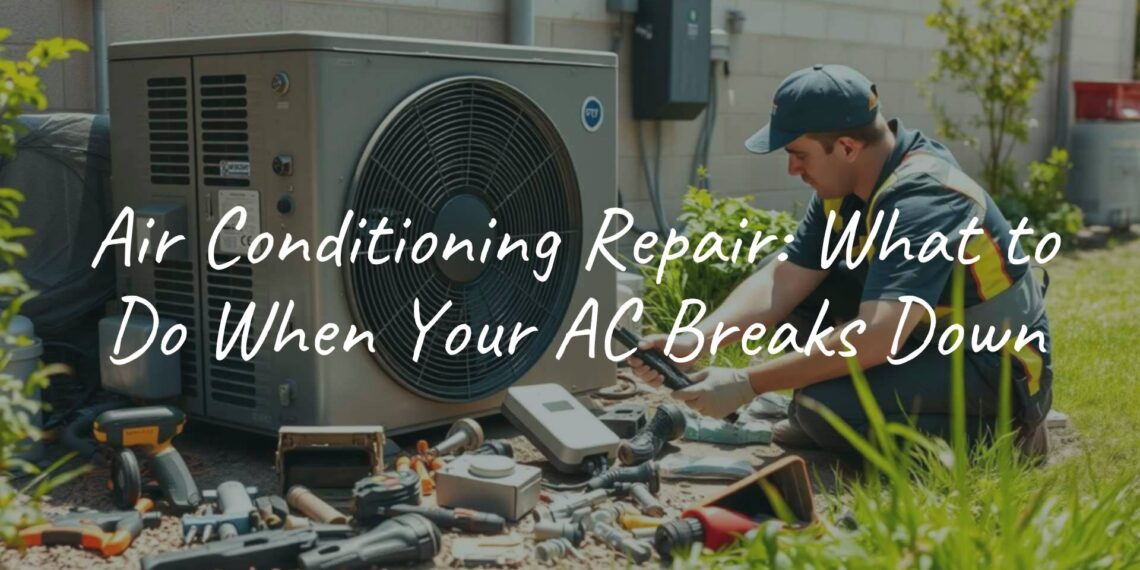Air conditioning repair means finding and fixing problems that stop your AC system from working as it should. This includes a wide variety of tasks, from small fixes to replacing major parts, all done to return your home to a comfortable, cool state. If your air conditioner starts blowing warm air, makes unusual sounds, or won’t start, repair becomes necessary-especially in the hot months of summer.
Learning the basics about AC repair can help you avoid stress and can even save money. Some small problems can be handled by homeowners, but many things should be left to a trained technician. This article covers what AC repair involves, typical problems and causes, and how to handle them to keep your home comfortable.

What Is Air Conditioning Repair?
Air conditioning repair means finding what’s wrong with your AC system and fixing it. Trouble can come from electrical faults, leaks in refrigerant lines, or broken mechanical parts like fans and compressors. The main goal is to bring back proper cooling and to help your system run quietly and without wasting power.
Repair work usually starts with a complete check-up to find what’s causing the trouble. Technicians use special tools to test parts, and then suggest repairs. This can mean cleaning, changing out worn parts, recharging the refrigerant, or fixing electrical faults.
Common Types of Air Conditioning Systems Needing Repair
Even though all ACs work on similar ideas, each type has its own parts that might break. Central air conditioning systems are the most common type needing repair-these have an outdoor condenser and an indoor evaporator coil (often called the A-coil). These cool your whole home using a network of ducts.
Other types that sometimes need repairs are ductless mini-split systems, which are common for homes with separate zones or smaller rooms, and window or portable units. Since window units are cheaper, people often replace rather than fix them. But for mini-splits and central units, it’s usually worth fixing them to make them last longer and work better.

What Problems Can Air Conditioners Have?
As with other machines, air conditioners can have problems after regular use. You might see your unit stop working altogether, just blow warm air, make new or odd noises, or leak water onto the floor.
Problems can come from inside as well. The compressor (which moves refrigerant through the system), the condenser fan motor (which releases heat outdoors), and electrical parts like capacitors and contactors can stop working right. There can also be leaks in the refrigerant lines, clogged drain lines, or faulty thermostats. Each needs a different way to find and fix the problem.
Signs Your Air Conditioner Needs Repair
Noticing trouble early can save you more expensive repairs later. Your AC will often show signs something’s wrong before it completely breaks down. Watch for these warning signs so you’ll know when to call for help:

No Cool Air or Weak Cooling
This is the most common and annoying sign. If your system is running but not blowing cold air, or if it’s not cooling your house enough, something could be wrong. Maybe you have low refrigerant because of a leak, a failing compressor, or a condenser unit that isn’t releasing heat properly.
Sometimes the fix is simple, like putting in a new, clean air filter, but if the problem continues, check into it right away. Also, if the blower in the air handler isn’t working, you won’t get any air-warm or cool-from the system.
Strange Noises or Shaking
Your AC should run with a low, steady sound. If you hear grinding, squealing, banging, clanking, or hissing noises, something is wrong. Grinding can mean the motor’s bearings are wearing out, and hissing might mean you have a refrigerant leak. Loud clanks or bangs could mean something is loose inside the unit.
Shaking, especially from the outdoor condenser, can point to a loose compressor or problems with the fan. Don’t ignore these noises-they often mean a repair is needed soon to prevent worse problems.
Leaks or Extra Moisture
Some moisture or small puddles near the outdoor unit are normal. However, if there’s a lot of water under the indoor unit, or you see visible leaks, something is wrong. It’s usually due to a blocked condensate drain line, which stops water made during cooling from draining away. If this is blocked, it can cause water to overflow or even damage your home.
Frozen coils inside the air handler can make too much water as the ice melts, causing leaks. If you see this, fix the problem quickly to stop mold or house damage.
AC Turns On and Off Quickly (Short Cycling) or Runs All the Time
If your AC is starting and stopping too fast without cooling fully, that’s called short cycling, and it puts a lot of stress on the compressor. This can be caused by too big a unit, a faulty thermostat, or low refrigerant.
If the system runs all the time but can’t get the house cool, it might mean there’s trouble with the thermostat, low cooling power, or maybe your house lets cool air leak out. Both of these should be looked at by a professional.
Burning or Electrical Smells
If you smell burning or something electrical from your vents or AC unit, turn it off right away using the thermostat and the circuit breaker. This can mean wires are overheating, the motor is burnt, or a major electrical part is failing-all serious problems that need a professional fast. These issues can cause fires if ignored.
If you notice musty smells, it might mean mold is growing inside the ducts or the coil. While not as dangerous as electrical problems, this can be bad for indoor air and still requires repair.
What Causes Air Conditioning Systems to Break Down?
If you know what usually breaks ACs, you can avoid problems and understand repairs more easily. Many breakdowns are caused by skipping regular filter changes or other simple upkeep, but some are from regular wear and tear.

Dirty or Clogged Filters
Clogged air filters are the most common reason air conditioners stop working well. If the filter is stuffed with dust and dirt, air can’t flow over the coil properly. This makes cooling less effective and can even freeze the coil, which leads to leaks and poor cooling. Changing the filter regularly-every 1-3 months-keeps air moving well and helps your AC last longer.
Refrigerant Leaks
Refrigerant is what carries heat out of your home. If you have a leak, there won’t be enough refrigerant, and your AC can’t cool right. Leaks are often caused by old or rusty pipes and coils. Besides weak cooling, you might hear hissing, see ice on the coil, or notice higher electric bills.
Leaks need a professional to fix them: they’ll find the spot, repair it, and put in the exact right amount of refrigerant. Just adding more refrigerant doesn’t solve the core problem.
Bad Thermostat
The thermostat tells your AC when to run and what temperature to keep. If the thermostat stops working, your AC might not turn on, may cycle on and off too fast, or might run non-stop. Problems could come from low batteries, messed-up settings, wiring trouble, or a sensor issue.
Often, checking or resetting the thermostat helps, but if that doesn’t work, get help from a technician.
Electrical Failures
Today’s AC units depend on many electrical parts. The contactor (which turns power on and off to the compressor and fan) and the capacitors (which give the starting boost) wear out pretty often. Tripped circuit breakers, frayed wires, or control board failures also stop ACs from running. These jobs can be risky and need the right tools, so it’s best for a trained tech to handle them.
Blocked Drain Lines and Frozen Coils
The evaporator coil inside collects heat and moisture from your air. When the tiny drain line gets blocked by dirt, algae, or mold, water can back up and cause leaks. If the airflow is blocked (like from a dirty filter) or refrigerant is low, the coil can freeze and cause poor cooling and water leaks as the ice melts. Cleaning and clearing these parts are important and often need a technician’s tools and knowledge.
Can You Fix an Air Conditioner Yourself?
It’s tempting to fix an AC yourself to save on repair bills. Some tasks are safe for homeowners-others aren’t. Always put safety first and stay within your knowledge.
Safety Steps Before Working
Since you’re dealing with electricity, always turn off power before starting. Flip the circuit breaker for the AC unit at your main panel and pull out the disconnect block near the outside condenser. Check wires with a tester to make sure the power is off. Wear gloves and safety glasses, and be careful with capacitors-they can hold a charge even after the power is off and must be discharged quickly and safely. If you’re not confident, call a professional.
Easy Do-It-Yourself Fixes
Some common problems you can likely handle yourself if you’re skilled with basic tools:
- Change a dirty air filter-this improves airflow and cooling.
- Clean outdoor condenser coils-spray gently upwards with a hose to clear away dirt.
- Check and reset any tripped circuit breakers for the indoor air handler and the outdoor condenser.
- In older units, replace small parts like contactors or capacitors (only if you feel safe and know what you’re doing; always discharge capacitors first).
For many parts, you might find replacements for less than $100 in parts and a couple of hours of work. But remember, safety and clear instructions are key.
When to Call a Technician
For more difficult jobs, call a technician. This includes:
- Refrigerant leaks or refilling refrigerant
- Compressor issues
- Electrical problems you’re not sure about
- Problems inside the A-coil (inside the furnace or air handler)
If your AC still isn’t working after 30 minutes of trying the easy fixes, or if you don’t feel safe, get help from a professional. Trying repairs you’re unfamiliar with can make things worse and might void your warranty.
How Air Conditioning Repair Works: Steps Technicians Take
When you call a repair expert for your AC, they follow a clear process:

Step 1: Inspection and Finding the Problem
The tech asks about what you’ve noticed-like no cooling, sounds, or smells. Next, they check inside and around your AC for damage, leaks, or blockages. They’ll examine the coils, drain lines, filters, and thermostat settings, and use tools such as multimeters to check electrical parts.
Step 2: Cleaning and Upkeep
If dirt or lack of maintenance caused the issue, the technician may:
- Clean the condenser coils outside
- Clean the evaporator coil (if needed)
- Unclog the condensate drain line
This can solve many problems and helps the system last longer.
Step 3: Checking Fuses and Electrical Parts
The technician checks for blown fuses, worn out contactors, or failed capacitors using a multimeter. These are common causes for AC systems not starting. If anything’s faulty, they replace those parts.
Step 4: Replacing Broken Parts
After finding a bad part, the tech replaces it. Capacitors and contactors are the most common, but they might also replace a fan motor, repair a refrigerant leak, or (if needed) replace the compressor. For new parts, they check the AC model to get the right match.
Step 5: Testing System Performance
Once repairs are finished, they put everything back together, turn the unit on, and test it. They check if the temperatures and pressures are right, listen for strange noises, and look for leaks. They’ll explain what they did and might suggest tips to keep your AC in good shape.
| Repair Step | Main Tasks |
|---|---|
| Inspection | Ask about symptoms, check filters, coils, thermostat |
| Cleaning | Clean coils, drain lines |
| Electrical Checks | Test fuses, capacitors, contactors |
| Part Replacement | Install new parts, fix leaks, recharge refrigerant |
| Final Testing | Power up, check cooling, explain repairs |
How Much Does Air Conditioning Repair Cost?
Repair costs can range widely, depending on the problem. Knowing what drives the price can help you plan.
Common Costs for AC Repair
| Repair Type | Estimated Cost (Parts Only) |
|---|---|
| Replace capacitor/contactors | $10-$100 |
| Replace blower or fan motor | $150+ |
| Fix refrigerant leak/recharge | Varies (labor-intensive) |
| Compressor replacement | Expensive, close to new unit cost |
Simple problems-like tripped breakers or filter changes-may cost only the service visit. Larger jobs cost more, especially as labor and parts add up. Urgent jobs or calls during the hottest days often mean higher prices.
What Decides the Final Price?
Repair cost depends on:
- The specific broken part
- Labor rates in your area
- Emergency/after-hours charges
- How old and what type your AC is
- How easy it is to access and fix the problem
A part that is rare or hard to get, or a long diagnostic process, can push up the overall bill.
Should You Repair or Replace?
If repair is over half the price of a new unit and your current AC is 10-15 years old, replacement makes more sense. New systems use less power and save on bills. If your system is newer and just needs a typical part, repair is normally much cheaper. An honest technician will explain what makes the most sense for you, considering your system’s age and condition.
How Maintenance Prevents Future Breakdowns
Like your car, an AC lasts longer and works better if serviced regularly. Maintenance keeps your system running well, lasting longer, and can stop surprise failures that are bothersome and expensive.
Main Benefits of Yearly AC Upkeep
- Catches problems early-so you avoid big repairs
- Keeps your system running efficiently-lower bills
- Makes the system last longer
- Helps keep air inside your home clean
Regular checkups should include looking at filters, coils, and drain lines. Many issues can be caught and fixed during routine visits by a technician.
How Often Should Maintenance Be Done?
Have a professional check and service your AC once a year, usually in the spring. This gets your system ready for the hot season. You should also:
- Change or clean your filter monthly or quarterly
- Keep the outside condenser clear of plants and debris
- Check the drain line for blockages-pour distilled vinegar down to prevent clogs
With these simple steps, your AC will work better and last longer.
How to Pick a Trustworthy Air Conditioning Repair Service
Choosing a good technician makes fixing your AC easier and gets better results. Here’s what you should look for:
What Makes a Good AC Repair Technician?
- Certified and licensed for HVAC in your state
- Training certificates, like NATE
- Experience with your type and brand of system
- Good reviews or references
- Clear communication and professional behavior
Questions to Ask Before Hiring
- Do you have experience with this model?
- How do you charge-by the job or by the hour?
- Is there a diagnostic fee? Does it apply to the repair if I hire you?
- Are you insured and bonded?
- What kind of warranty do you give on work and parts?
- How soon can you fix my system?
Warranties and Service Guarantees
A reliable AC company stands behind what they do. Ask about their parts and labor warranties. Many offer 30 days to a year, covering both parts and workmanship. If a problem returns shortly after repair, they should fix it under warranty. Knowing about warranties helps you relax, knowing you’re protected.
Frequently Asked Questions about Air Conditioning Repair
How Long Do Repairs Usually Take?
Simple fixes (like replacing a capacitor) can often be finished in one to two hours. More serious issues, like a refrigerant leak or big electrical problem, might take several hours. If special parts are needed, it could take a few days to finish. Most repairs are done in one visit, unless it’s a serious or unusual problem.
Does My Warranty Cover AC Repairs?
This depends on your unit’s age, what’s broken, and whether repairs are made by an approved technician. Most new ACs have warranties covering the compressor for 5-10 years, with shorter warranty on other parts. Labor is often not included. Damage from neglect or outside forces is usually not covered. Always check your warranty documents or ask the manufacturer before scheduling service.
What Should I Do If the AC Breaks in a Heat Wave?
First, focus on staying safe and cool. If you smell burning, turn the unit off with the thermostat and breaker. Try basic steps like:
- Checking and resetting breakers
- Checking that the thermostat is set correctly
- Inspecting the air filter
If these don’t work, call an AC repair service. During heat waves, wait times for technicians may be longer. While waiting, use fans, close curtains, keep hydrated, and if needed, stay in public places with AC. For complex problems, don’t try to fix it yourself-professional help is safer and more lasting.
















![What to with Scrap Metal? [infographic]?](https://facts-homes.com/wp-content/uploads/2019/07/645413-POPYOV-391-120x86.jpg)





